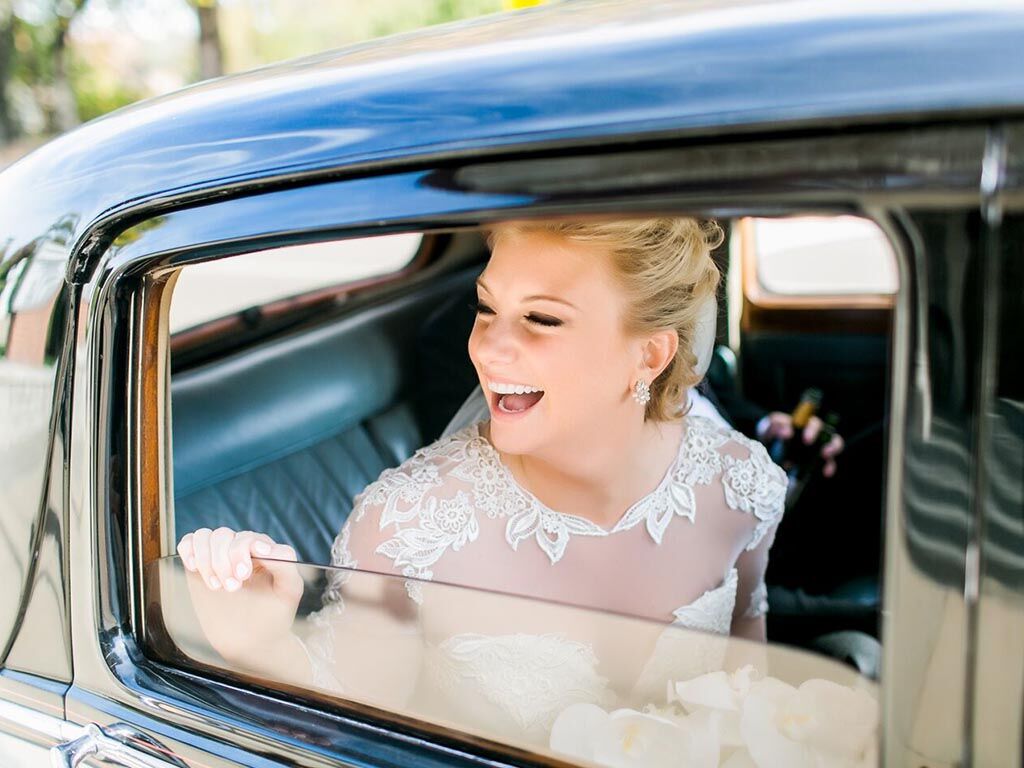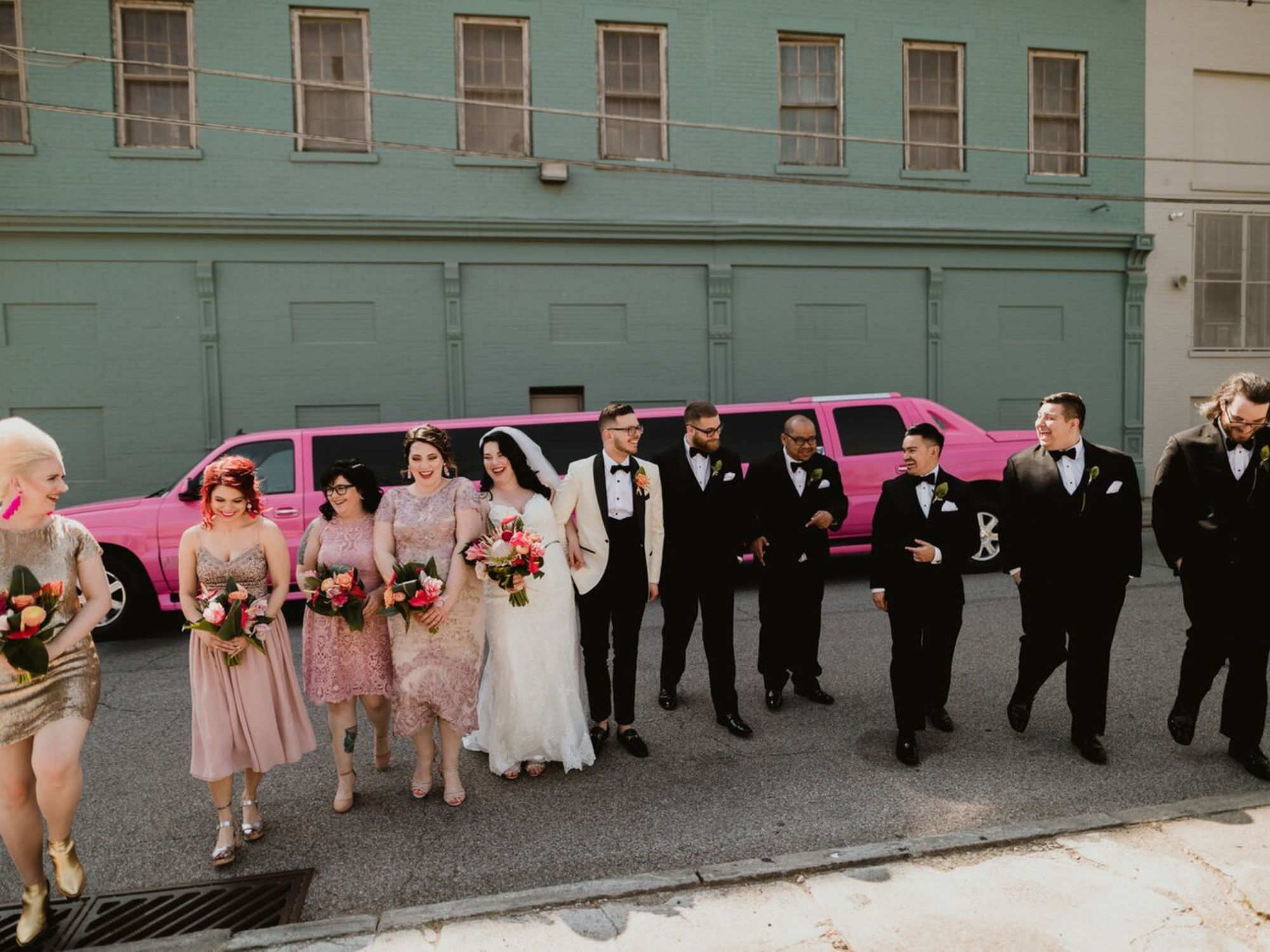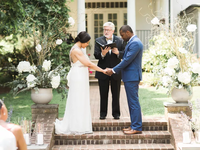Your Lawyer-Backed Guide to Wedding Officiant Contracts
It's no secret that the marriage ceremony is the most important aspect of the wedding day—and choosing the right officiant is key. These individuals will play a crucial role in your big day, and the months and weeks leading up to it. Once you research—and ultimately find—your wedding officiant using The Knot Vendor Marketplace, you'll need to sign a contract to seal the deal. The wedding officiant contract, like all other wedding vendor contracts, should feature some specific key points to ensure your day goes off without a hitch (pun-intended, of course); however, it can be hard to know exactly what questions to ask and what key points to include. That's why we tapped experts—a lawyer and two officiants—to weigh in on wedding officiant contract terms, principles, sections and best practices for both parties.
1. General Info
Don't overlook the basics of a wedding officiant contract for services, says Leah Weinberg, attorney, co-founder and partner of Oduberg Law, LLP. "It's easy to assume that your officiant (and any vendor) has your names, wedding date, location and ceremony time in their system." However, "it's good practice to double-check all of that information to make sure it's accurately stated in the contract.
2. Marriage License Info
According to wedding officiant Chris Shelley of Illuminating Ceremonies, "language must be in place to make it very clear that the couple is responsible for obtaining the marriage license, and that they must have it with them for the officiant to officiate." Additionally, if the couple were to marry at a previous event, "the professional wedding officiant must see that legal document before agreeing to pronounce them married."
Rev. Laura Cannon, wedding officiant and owner of Ceremony Officiants, echoes these sentiments, telling The Knot that, in many states, "It is a punishable crime for an officiant to marry someone without a valid marriage license." That said, "It is extremely important to make sure you understand what you are required to have with you on your wedding day in order for the officiant to legally perform your marriage ceremony. "
3. Ceremony Start Time
Both Cannon and Shelley stress the importance of including the ceremony start time in your wedding officiant contract, with the latter telling The Knot that "most officiants only offer a 15-30-minute grace period." Think of it this way, explains Shelley: "Officiants are not like other vendors—it is very common for us to officiate more than one wedding in a day, so the start time is a sacrosanct detail."
4. Length of Ceremony
Per Weinberg, "Ceremony lengths can run the gamut from 30 minutes to 45 minutes to an hour plus, and sometimes even as little as five minutes (yes, I've had a couple of those)." Because of that—combined with the varying amount of work involved, depending on the length of the ceremony—"how long you want your ceremony to be should be stated in the contract with your officiant." Moreover, she explains, "They are going to charge based on that factor, and it's just another detail that's helpful to include in writing to make sure that both parties are on the same page."
5. Pricing and Fees
According to Weinberg, knowing when—and how much—your wedding officiant gets paid is arguably one of the more critical points of the contract." With that in mind, she recommends triple-checking the amount on the contract and setting "calendar reminders for yourself for when payments are due because your officiant may not always be invoicing you." Additionally, Cannon recommends utilizing this section to outline any and all extra fees you may incur, including parking and transportation. Also, it may be worth addressing what happens if there is an unexpected delay (i.e., wedding transportation breaking down) that would cause the ceremony start time to be pushed back and subsequently require the officiant to charge an additional fee for waiting.
6. Rehearsal Language
Shelley tells The Knot that rehearsal language must be "made very clear," especially if you're choosing to have a wedding rehearsal on a different day than the actual wedding, communicate this clearly in the contract. "Some officiants can accommodate this, others can't, but that language must be in place, including any fees for non-wedding day rehearsals and timing of same-day rehearsals." For example, says Shelley, "one couple held their rehearsal in the morning, seven hours before the ceremony," which "required multiple trips to the venue because the wait in between would have been too long."



7. Scripts and Readings
To-be-weds can use this section to gain a better understanding of the officiant's role in their specific ceremony. Per Weinberg, some questions you may and want to address include: How exactly does the officiant write your ceremony, and what are the parameters? Is it 100% original? Are some parts from a standard script, but are other parts created from scratch? Do you get to select what readings are incorporated? Keep in mind that this information applies to all ceremonies, including multicultural, religious, interfaith and non-religous ceremonies.
8. Cancellation Agreement
"What a lot of people don't realize is that officiants work on ceremonies for several hours in the months and weeks ahead of the wedding day," explains Shelley, who adds that, "Often, the couple receives the written ceremony weeks before the wedding." With all this in mind, it's important to include what funds will be due upon cancellation within a certain timeframe and what happens to the ceremony script if the officiant's services are canceled." This is because, per Shelley, it's likely that "no professional officiant will condone the use of their script for use by a friend or family member officiating." Per Cannon, it's also worth outlining what happens if the couple changes their wedding date or time, or if the officiant gets sick at the last minute and can't make it.
9. Client Deliverables
"Most likely," says Weinberg, "there is going to be some homework" for the to-be-wed couple, and "whatever those assignments are will need to be stated in the contract." This will allow soon-to-be spouses to have a clearer understanding of their obligations, which could include "responding to a questionnaire or two or having an in-depth meeting with the officiant." That said, "the contract should specifically address what details and information you need to give your officiant in order for them to do their job and how that is expected to be delivered."
10. Deadlines (On Both Sides!)
Weinberg tells The Knot that "Wedding planning is a time-sensitive process with a lot of deadlines and deliverables, and crafting your ceremony is going to be no different." With this in mind, "In order to set expectations and obligations for both sides, your contract needs to include a date by which you have to provide the required information to the officiant. On the flip side, "the contract will also need to include a deadline for the officiant to provide an initial draft of your ceremony for review." The key? To be as specific as possible to ensure "that both parties are holding up their end of the bargain and that there won't be a mad rush the week of the wedding to get everything finished."
11. Review and Revisions
Put simply, says Weinberg, "Your ceremony is obviously a very critical part of your wedding day and a very personal one at that," which is why it's completely understandable that you'd want it to "be as close to perfect as possible." However, Weinberg notes that this will "require close collaboration with your officiant, and your contract needs to reflect that." In other words, "Ensure that your contract addresses how the parties will start the initial discussions about the ceremony," including when you'll receive an initial draft, how long you have to review that draft (and future ones) and how many rounds of revisions are included with the officiant's fee. Also, "make sure that both parties leave themselves enough time for this in-depth review process to avoid scrambling close to the wedding to finalize everything."





















